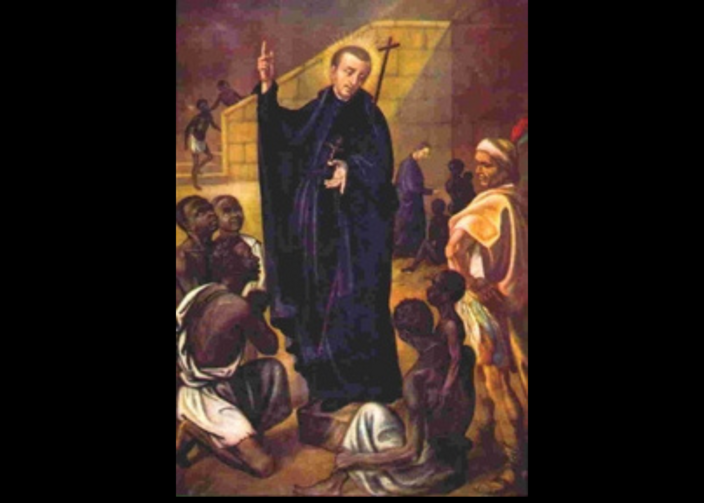A Reflection for the Memorial of St. Peter Claver, Priest
Find today’s readings here.
Lead me in your justice, Lord. (Ps 5:8)
Grappling with a saint’s complicated legacy can be uncomfortable.
Today marks the feast of St. Peter Claver, a Jesuit priest who is perhaps best remembered for his ministry to enslaved African people in the 17th century. He is the patron saint of African missions, the nation of Colombia and interracial justice.
It’s probably futile to try to fit any 17th-century church figure into our contemporary narrative of racial justice, but many accounts of the life of Peter Claver seem to make an attempt. He begged for food that he ended up sharing with slaves in need; he treated people who had contracted diseases while living in miserable conditions on their months-long sea voyages; he baptized tens of thousands in a society where slave owners were more likely to see humanity in fellow Christians. This is all true—and all good and meaningful. So what’s the problem with Peter Claver’s legacy?
Well, the criticism can be sorted into two different categories—some of Claver’s actual biography, and some of the way the church uses him.
In a moving piece in America in 2021, Christopher Smith, S.J., addressed what Peter Claver means to Black Catholics today. The author notes that the saint “himself owned and mistreated enslaved people throughout his Jesuit life” and points readers to Katie Grimes’ book “Fugitive Saints: Catholicism and the Politics of Slavery” for more on Claver and race. Moving from the saint’s biography to the church’s contemporary portrayal of him, the author writes that “we often hold up Peter Claver to excuse our neglect as a church of people who look like me. I say this as the only Black American Jesuit in formation on Earth.”
As Christopher Smith’s essay relays, the modern Catholic Church has made grievous errors in its treatment of people of color. It’s not fair to use the ministry of someone like Peter Claver to tell a story of a church that stands as a savior to Black and enslaved people. It’s uncomfortable to confront the ugly parts of our history, but it’s damaging to forget or reimagine them.
In our church’s tradition of the communion of saints, we remember lives long after they end. We should do our best to remember them honestly and in their complex fullness—the kind that reflects our own reality of imperfection. But opening our hearts to the saints is about much more than knowing their biographies; it’s about accepting the baton that they pass to us, the work of carrying out a kind of justice not our own.
God’s justice lasts longer than my life or my efforts—and it is more expansive than my (or Peter Claver’s) blindspots and mistakes. That’s why I have to be led by something much greater than my desires or the norms of my day, as today’s psalm sings.
Lead me in your justice, Lord. May a truthful picture of the lives of the saints be part of that.








